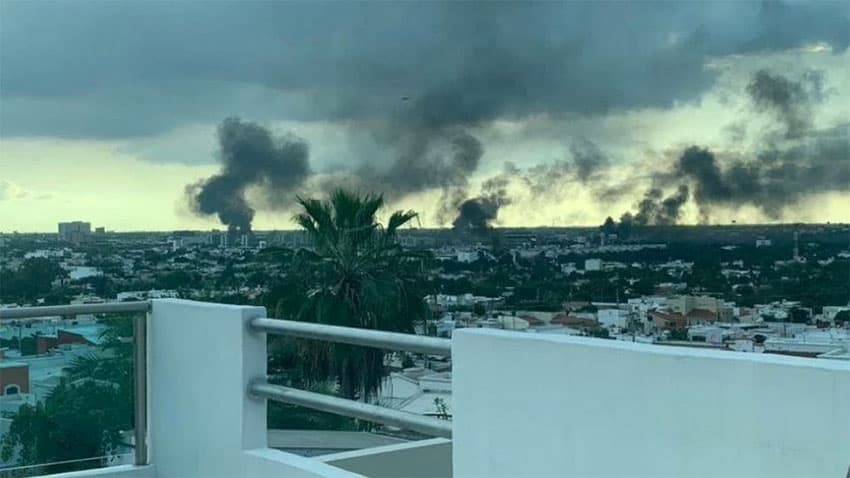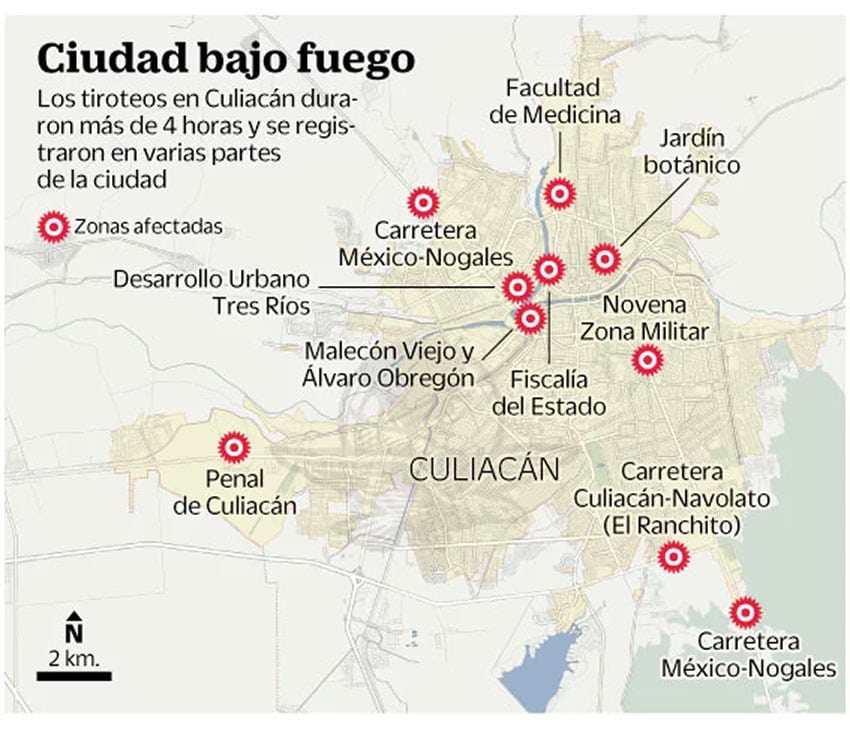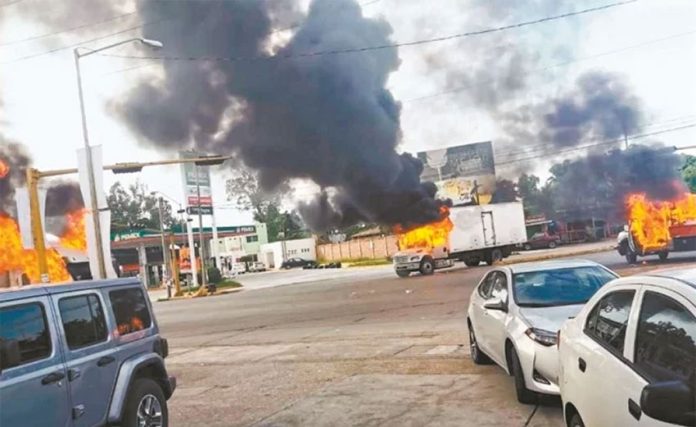Security forces released a son of convicted drug trafficker Joaquín “El Chapo” Guzmán on Thursday after his arrest in Culiacán, Sinaloa, triggered a wave of cartel attacks that terrorized residents of the northern city.
Security Secretary Alfonso Durazo told the news agency Reuters late on Thursday that soldiers and members of the National Guard retreated from the Culiacán home where Ovidio Guzmán López was captured “without Guzmán, to try to avoid more violence in the area and preserve the lives of our personnel and recover calm in the city.”
Violence broke out in Culiacán at about 3:30pm and quickly spread as rumors swirled about the capture of one of “El Chapo” Guzmán’s sons.
There were gunfights and blockades, some of which were formed by setting trucks and other vehicles on fire, at several locations in Culiacán, generating what Durazo called “a situation of panic.”
The security secretary said last night that 30 members of the army and National Guard were attacked by armed civilians at a house in the Culiacán neighborhood of Tres Ríos on Wednesday afternoon while carrying out a routine patrol.

The security forces returned fire and “took control” of the house, where they found four people, including Guzmán López, a Sinaloa Cartel leader wanted in the United States on drug trafficking charges.
Durazo said several groups of armed criminals quickly surrounded the house, outnumbering security forces.
“Likewise, other groups carried out violent acts against citizens in several points of the city generating a situation of panic. With the aim of protecting the greater good . . . of Culiacán society, the officials of the security cabinet agreed to suspend the actions,” he said without clarifying whether Guzmán López remained in custody.
Durazo subsequently told Reuters that the 28-year-old had been released and a lawyer for the Guzmán family confirmed in an interview that Ovidio Guzmán was free.
Durazo’s assertion that Guzmán López, one of four children from El Chapo’s second marriage, was arrested during a routine operation contradicted other federal officials who told the newspaper Milenio that the detention came during a targeted operation.
In the hours following the arrest, Sinaloa Cartel gunmen took control of Culiacán in a terrifying show of strength.
Scores of videos posted to social media showed citizens running for cover or trying to hide amid bursts of gunfire. Photographs showed black plumes of smoke rising above the city.
One image showed two heavily armed men in the back of a truck with their weapons, including an M2 machine gun, at the ready. Another showed gangsters with military-grade weapons in a pickup truck just two blocks from the municipal palace in downtown Culiacán. Milenio said that the violence “exceeded any precedent” in the city.
In one photograph published online, two men, one of whom is wearing a camouflage shirt and a bullet-proof vest, are seen lying dead on the street in a pool of blood.
A video posted to Twitter showed families with young children lying on a road next to their cars as gunfire raged.
“Dad, can we get up now?” a young boy said to his father. “No, stay there on the ground,” the man responded with a trembling voice.
Other videos showed masked, heavily armed-men blocking streets and stopping traffic. Businesses closed across the city, public transit was suspended and residents locked themselves in their homes.
Estuvieron muy calurosos los abrazos en #Culiacan pic.twitter.com/7aVbwOHgVE
— Efrén Chávez Sotelo (@EfrenChSotelo) October 18, 2019
In the middle of the chaos, more than 50 prisoners escaped from the Culiacán penitentiary.
Video footage showed the prisoners, accompanied by armed men, stopping and then hijacking vehicles traveling on a street outside the jail. Four prisoners were later recaptured, state security secretary Cristóbal Castañeda said, but 49 remained at large on Friday morning.
Castañeda said two prison guards were killed during the prison break and that 21 other people were wounded in the wave of attacks across Culiacán. At least four soldiers and two state police officers are among the injured.
“It was a very difficult, intense and complicated afternoon . . .” said Sinaloa Governor Quirino Ordaz, whose government issued a statement urging residents to “keep calm.”
Speaking at his morning press conference on Friday, President López Obrador said that he supported the security cabinet decision to release Guzmán López.
“. . . The situation became very difficult and a lot of citizens, a lot of people were at risk,” he told reporters.

“I was in agreement [with the decision] . . . because we can’t have massacres . . . the capture of a criminal cannot be worth more than people’s lives,” López Obrador said.
“You can’t put out fire with fire, this is the difference of this [security] strategy with those . . . [of] previous governments, we don’t want deaths, we don’t want war, this is hard for many people to understand but the strategy that was being applied turned the country into a cemetery.”
Source: El Universal (sp), Milenio (sp), Reforma (sp), Reuters (en)
